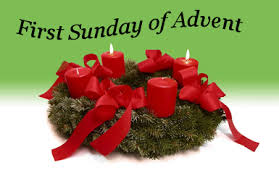To be watchful and happy was the priest’s clarion call at a death anniversary Mass I attended yesterday, the last day of the liturgical year. The inspired celebrant referred to the apocalyptic times, as suggested by the day’s Readings, and then spoke with unction about the dispositions proper to the new liturgical season beginning today: Advent. It is a time to be happy, but as in life in general, we ought not to lower our guard, for only watchfulness can ensure true happiness, he said.
Today’s Gospel text (Mk 13: 33-37) echoes that message as Our Lord exhorts us: “Take heed, watch and pray: for you do not know when the time will come.” This is the final part of Jesus’ eschatological discourse, occasioned by a disciple’s praise for the built heritage of Jerusalem. “Look, teacher, what stones and what buildings!” And Jesus said to him, “Do you see these great buildings? There will not be one stone left upon another that will not be thrown down.” Well, what words and what foretelling! In 70 A.D., the Romans destroyed the city and the Temple.
As an upshot of the parables heard on the last three Sundays, “when the time will come” does not refer as much to the forthcoming Christmas Day as it does to the Parousia or Second Coming. Jesus compares the situation to a man on a journey: when he returns, unannounced, wouldn’t he like to find the doorkeeper on guard rather than asleep? He could arrive in the evening, at midnight, cockcrow or in the morning – the four parts or vigils of the night – 18-21 hours; 21-24 hours; 0-3 hours; 3-6 hours, respectively. Likewise, Our Lord will come at a time least expected of Him; so, “Watch!”

The first Sunday of Advent sees the return of the season’s best-known Prophet: Isaiah. He is no sentimental softie. In the First Reading (Is 63: 16b-17; 64, 1.3b-8), pointing to the Lord’s kindness as a cause for humans to go astray and not fear Him, he urges the Lord’s early coming: “O that thou wouldst rend the heavens and come down, that the mountains might quake at thy presence.” He compliments those who “wait for Him” and implores Him to not leave people to their iniquities, for “thou art our Father; we are the clay, and thou art the potter; we are all the work of thy hand.”
Truly, who are we without the Divine Potter? Only dust. Yet, how quickly we forget Him who has made us! We act with arrogance and offend Him night and day, whereas those who fear the Lord beseech Him: “God of Hosts, turn again, we implore; look down from heaven and see. Visit this vine and protect it, the vine your right hand has planted.” (Ps. 79: 15-16)
Finally, St Paul (1 Cor 1: 3-9) thanks God for the spiritual gifts with which He has enriched his mission. However, we know that graces do not come at once; like yeast, they are meant to grow till the glorious revelation of Our Lord Jesus Christ. God who has called us into the fellowship of His Son will sustain us guiltless till the “Day of Our Lord”. And how is the Apostle so sure that this will happen? He first visited his people two millennia ago, just as the prophets had announced, and will keep his promise to visit us again!
Everything happens in His time; all we need to do is keep watch. Simple shepherds once did so in Bethlehem and became harbingers of the Good News. While watchfulness is a laudable Christian attitude, Parousia, however, must never become a cause for fear, anxiety or any morbid curiosity.
Likewise, let us not make externals the focus of Christmas; instead, let us establish our hearts in holiness at the coming of Christ (1 Thes 3: 13). It is not for nothing that, before His departure, Our Lord and Master spoke of vigilance. In vigilance and patient persistence lies the secret of eternal bliss.